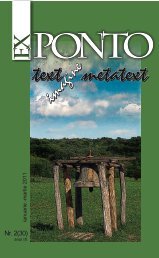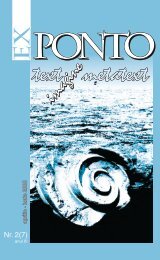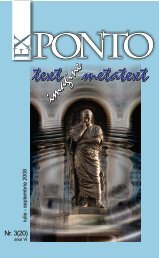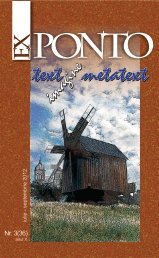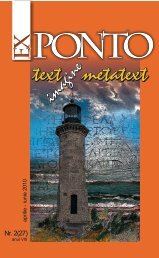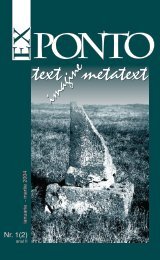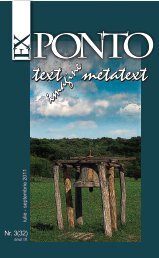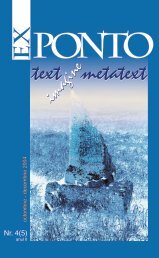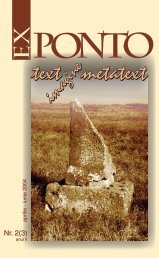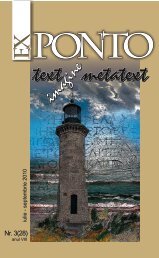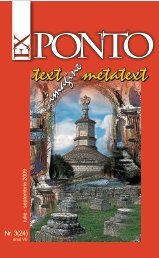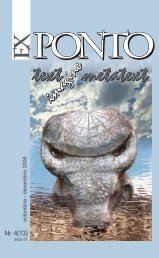Stepping back from a positivist theory of causality, Adriano Moreira useshis hermeneutic device along the lines of the Aronian Verstehen epistemologyin order to produce knowledge on the nature of choice and the moraldilemmas that go with it. It is a system of interpretation meant to bring light tothe normative structures constituting the social world and to make clear thatpolitical choices are often difficult and always carry with them a specific priceto pay. The method proceeds then through theoretical examples (exemplosde escola) whose dilemmatic character accentuates the dramatic nature ofchoice. There are opposing ethics of action at play and these bring differentimplications to bear both on individuals’ lives and on the life of politicalcollectivities. Every ethics of action is a world unto itself given that they aresubject to non-coincidental political finalities. A crucial exemplo de escola is theshipwreck, in which the tabula unicapax allows the symbolic rescuing of onlya child, or Albert Einstein, or a national flag, or a painting, the whole pointingtherefore at what is the omega point ascribing meaning to opposing politicalprojects. It does not have the same meaning, in terms of a life project, to rescuea child or Einstein from a shipwreck or to opt between a national flag and aRubens amongst the flames of a fire. There are different meanings, in termsof a global relationship project, inherent to the fidelity towards the state, thenation or a global originary community. The ethics of political action differs fromcase to case, which means that the basic value serving as guiding principle forhuman interactions does not coincide. In Direito Corporativo (1951), AdrianoMoreira clarifies the problematique in the following way:It has become a classic, in order to exemplify the transpersonalistapproach, to remember that, on the occasion of sacrificing the isle of Philetemple, on the Nile, to an irrigation plan, sir George Birdwood, who protestedagainst such plan, answered to the following question –« What would youdo, if alone in a house on flames, obliged to opt between rescuing a childand Raphael’s Madonna? » – that he would decidedly opt for the salvationof Raphael’s Madonna 23 .It is my argument that such exemplos de escola are meant to explore thepossibilities of the ‘political’ beyond the actual set of political relations and toexplore the ‘international’ beyond the set of international relations operative in aparticular conjuncture. It is then a way of critically exploring the possibilities andthe limits of human sociableness entangled in opposing ethics of action.CONCLUSION: ADRIANO MOREIRA’S IR THEORYAND GRAND THEORYConcluding, I would argue that Adriano Moreira’s IR theory draws basicallyon an intellectual exercise that, though rejecting positivism, is essentiallymodern, assuming the social world as a hermeneutic problem which is possibleto solve in the sense that it is possible to accede to the inner meaningsactors attribute to their actions and social interactions. Adriano Moreira’sIR theory proceeds then basically through the enquiry into the intelligibilityof international society and human sociableness at large. Accordingly, theintelligibility of the social world, and of international relations, depends on thepossibility of producing a coherent answer to the hermeneutic problem and ofproducing knowledge thereof. Adriano Moreira’s broad affirmative answer tothis problematique gives content to what is his generally modern approach toacademic International Relations. That is why, I argue, his claims on knowledgeEx Ponto nr.3, <strong>2006</strong>173
production about the ‘international’ end up making his theoretical approachmatch that which Quentin Skinner calls ‘grand theory’. In the formulationof the British thinker, this corresponds to the construction of abstract andnormative theories on human nature and conduct turning a crucial light to theclarification of the problematique of social action and structures 24 . Like thereluctant theorizers put up by Skinner, in Adriano Moreira too the productionof a ‘grand theory’ seems to fight against the epistemological skepticism foundin his unveiling of contingency and situatedness as human circumstancesresisting the kind of generalizations produced in natural sciences. In Skinner’sown words, “[t.]o describe such skeptics as grand theorists may well sounddangerously like missing the point” 25 . And yet, which is only paradoxical, it ishis skepticism vis-à-vis the possibility of achieving generalizing explanatoryschemata which leads Adriano Moreira to the formulation of a comprehensive‘grand theory’ of human sociableness.Ex Ponto nr.3, <strong>2006</strong>1idem, ibidem, p. 342David Mapel and Terry Nardin, “Introduction” in idem, eds., International Society: DiverseEthical Perspectives, Princeton University Press, Princeton, NJ, 1998, p. 63cf. Hedley Bull, “The Importance of Grotius in the Study of International Relations” in Bull,Kingsbury and Roberts, eds., Hugo Grotius and International Relations, Clarendon, Oxford,1990, p. 934idem, ibidem, p. 535Hugo Grotius, De Jure Belli ac Pacis Libri Tres, 1625 (original ed. Le droit de la guerre etde la paix, French translation by P. Pradier-Fodéré, PUF, Paris, 1999, p. 11)6cf. Howard Williams, International Relations and the Limits of Political Theory, Macmillan,London, 1996, p. 797Hugo Grotius, op. cit., p. 98Francisco de Vitoria, De potestate civili, 1528 (original ed. Leπon sur le pouvoir politique,French translation by Maurice Barbier, Vrin, Paris, 1980, pp. 57-58). « Imo, cum una Respublicasit pars totius orbis, et maxime christiana provincia pars totius Respublicae, si bellum utile sit uniprivinciae cum damno orbis au Christianitatis, puto eo ipso bellum esse injustum. »9Martin C. Ortega, “Vitoria and the Universalist Conception of International Relations” inIan Clark and Iver B. Neumann, eds., Classical Theories of International Relations, Macmillan,London, 1996, p. 10310Francisco de Vitoria, Relectio de Indis, 1539 (original ed. Relectio de Indis o liberatd delos índios, Consejo Superior de Investigación Científica, Madrid, 1967, p. 80)11Martin C. Ortega, op. cit., p.116<strong>12</strong>Martin Wight, International Theory: The Three Traditions, Holmes & Meier, New York,1992, p. 7713idem, ibidem, p. 7714Martin C. Ortega, op. cit., p. 11715idem, ibidem, p. 11616Richard Bernstein, Beyond Objectivism and Relativism: Science, Hermeneutics and Praxis,Basil Blackwell, Oxford, 1983, p. 1717Claudio Magris, “Utopia e Disincanto” in Magris, Utopia e Disincanto, Garzanti, Milan,2001, p. 1418cf. Raymond Aron, “La querelle du machiavélisme” in Aron, Machiavel et les tyranniesmodernes, Fallois, Paris, 1993, p. 38419Letter of Maritain to Aron, 30 September 1943, published in Aron, Machiavel et les tyranniesmodernes, p. 42520Raymond Aron, “Sur le machiavélisme: dialogue avec Jacques Maritain” in Aron, Machiavelet les tyrannies modernes, p. 43<strong>12</strong>1cf. Raymond Aron, “La querelle du machiavélisme”, p. 38822Jacques Maritain, “The End of Machiavellianism” in Maritain, The Range of Reasons,Charles Scribner’s Sons, New York, 1952, p. 13523Adriano Moreira, Direito Corporativo, p. 2224Quentin Skinner, “The Return of Grand Theory” in idem, ed., The Return of Grand Theoryin the Human Sciences, Cambridge University Press, Cambridge, 1985, pp. 3-2025idem, ibidem, p. <strong>12</strong>174
- Page 2 and 3:
Ex PontoText/imAgine/metatextNr. 3
- Page 4 and 5:
SUMAR♦EditorialOVIDIU DUNĂREANU
- Page 6 and 7:
editorialOVIDIU DUNĂREANUScriitoru
- Page 8 and 9:
poezieIULIA PANĂ* * *Cum ar trebui
- Page 10 and 11:
* * *m-am trezit în astă diminea
- Page 12 and 13:
IOAN ŢEPELEAPoemele mirării care
- Page 14 and 15:
Mona Lisa pare a acoperi chiar şoc
- Page 16 and 17:
în schimb, asfaltul te dinamizeaz
- Page 18 and 19:
în care ai putea să îţi întinz
- Page 20 and 21:
Un ins orbecăia ca în visOchii -
- Page 22 and 23:
Şi în secunda următoareSă apar
- Page 24 and 25:
CLAUDIA VOICULESCURondeluriDoar ste
- Page 26 and 27:
OLIMPIU VLADIMIROVMulţumireTrec nu
- Page 28 and 29:
prozăFLORIN ŞLAPACO teribilă set
- Page 30 and 31:
Ah, a zis Aloisius, ia uite-l şi p
- Page 32 and 33:
viaţa multor fiinţe zaharisite, a
- Page 34 and 35:
crede în ce facem noi. Apoi, câte
- Page 36 and 37:
- Dar sensibiloasă mai eşti, se s
- Page 38 and 39:
publicul avizat (şi nu numai) al u
- Page 40 and 41:
Din somn mă scoală-n miez denoapt
- Page 42 and 43:
Lumina cunoştinţii să-i facă ar
- Page 44 and 45:
memorialisticăPERICLE MARTINESCUPa
- Page 46 and 47:
asta este şi drama ţării mele, a
- Page 48 and 49:
provocând pagube importante, deşi
- Page 50 and 51:
formidabil, într-adevăr: nouă bo
- Page 52 and 53:
11 iulie Mâine dimineaţă plec la
- Page 54 and 55:
locul lor, tejgheaua şi rafturile
- Page 56 and 57:
cărui frunze fâşâiau în vânt
- Page 58 and 59:
originalul de lângă mine - la sca
- Page 60 and 61:
traduceri din literatura românăIL
- Page 62 and 63:
Rituella fête met cet être en tra
- Page 64 and 65:
elogios, recunoaşterea unanimă. P
- Page 66 and 67:
Furtuni înnebunind azurul, scutur
- Page 68 and 69:
Mă voi înzdrăveni cu mei proasp
- Page 70 and 71:
Cu suflu-i arzător crăpând buzel
- Page 72 and 73:
Marin Gherasim - Diptic, 1994, ulei
- Page 74 and 75:
IIIMarin Gherasim - Kairos, 2001, t
- Page 76 and 77:
Marin Gherasim - Aripă, 2000,ulei
- Page 78 and 79:
imagineMarin GherasimUn spirit inte
- Page 80 and 81:
Retrospectivă la Muzeul Naţional
- Page 82 and 83:
invitat „ex ponto”CARMEN CHIHAI
- Page 84 and 85:
vine din povestea lor. Or, noi avem
- Page 86 and 87:
Paradoxically, the myth of the unfo
- Page 88 and 89:
validate or invalidate the choices,
- Page 90 and 91:
versions, even those which contain
- Page 92 and 93:
tries to separate the editor’s do
- Page 94 and 95:
ConclusionFrom the Platonic myth of
- Page 96 and 97:
Fractalul este foarte aproape de pe
- Page 98 and 99:
Conceptul de text matricial (aplica
- Page 100 and 101:
Proximităţi şi diferenţe, unele
- Page 102 and 103:
Citit retrospectiv, Ionescu nimere
- Page 104 and 105:
avangardaPAUL CERNATÎntre extremel
- Page 106 and 107:
Cu relativă simpatie „revoluţio
- Page 108 and 109:
cu un cuprinzător eseu al d-lui Ni
- Page 110 and 111:
*În paginile revistei Integral nu
- Page 112 and 113:
la „stânga plasticei şi a liris
- Page 114 and 115:
geri a separării dintre artistic
- Page 116 and 117:
dar cu apucături de satir. Lukrezz
- Page 118 and 119:
participa direct la strălucirea su
- Page 120 and 121:
situaţii politice, a bravat fără
- Page 122 and 123:
Portretul de anarhist, pe care şi-
- Page 125 and 126:
Poate nu întâmplător, cel care-i
- Page 127 and 128:
mari scriitori români contemporani
- Page 129 and 130: se uite la foaia de/ Hârtie, care-
- Page 131 and 132: la recensământ.)/ -Pe-astea să l
- Page 133 and 134: (…)// Peste câţiva ani/ A înce
- Page 135 and 136: Ex Ponto nr.3, 2006baston, indifere
- Page 137 and 138: cronica literarăNICOLAE ROTUNDCons
- Page 139 and 140: Ex Ponto nr.3, 2006comentează în
- Page 141 and 142: priveam pe furiş maxilarele descă
- Page 143 and 144: Ex Ponto nr.3, 2006Nicolae Motoc pr
- Page 145 and 146: VALERIA MANTA TĂICUŢURăpit pe ve
- Page 147 and 148: Apelul la miturile precreştine est
- Page 149 and 150: Ex Ponto nr.3, 2006şi scadenţa M(
- Page 151 and 152: Ex Ponto nr.3, 2006cel al gepidei A
- Page 153 and 154: Ex Ponto nr.3, 2006lizare discursiv
- Page 155 and 156: Ex Ponto nr.3, 2006decât necesară
- Page 157 and 158: Ex Ponto nr.3, 2006‹‹cochilie
- Page 159 and 160: cronica literaturii străineADINA V
- Page 161 and 162: Ex Ponto nr.3, 2006Titlul romanul a
- Page 163 and 164: de a-l găsi pe cel care a salvat-o
- Page 165 and 166: Ex Ponto nr.3, 2006158aservirii rus
- Page 167 and 168: În mitul grec, odată cu suveranit
- Page 169 and 170: Ex Ponto nr.3, 2006162nu e conţinu
- Page 171 and 172: Un fenomen care pare pur occidental
- Page 173 and 174: studii culturaleMARCOS FARIAS-FERRE
- Page 175 and 176: Ex Ponto nr.3, 2006assume meaning i
- Page 177 and 178: Ex Ponto nr.3, 2006in rapid transit
- Page 179: Ex Ponto nr.3, 2006contingency of t
- Page 183 and 184: Ex Ponto nr.3, 2006Dar peripeţiile
- Page 185 and 186: Ex Ponto nr.3, 2006(24 dec. 1672 -
- Page 187 and 188: Ex Ponto nr.3, 20061705, ambii ai P
- Page 189 and 190: Ex Ponto nr.3, 2006Constantin Brân
- Page 191 and 192: Ex Ponto nr.3, 2006‘separatist’
- Page 193 and 194: Ex Ponto nr.3, 2006succedea pe tron
- Page 195 and 196: al XVII-lea - pentru a ne limita do
- Page 197 and 198: 41Arhimandritul Neofit a ocupat fun
- Page 199 and 200: o imagine cuprinzătoare a contribu
- Page 201 and 202: Ex Ponto nr.3, 2006Din subcapitolul
- Page 203 and 204: Ex Ponto nr.3, 2006Din primul studi
- Page 205 and 206: să devină fiinţe sociale, căci
- Page 207 and 208: sociologia cărţiiCONSTANTIN CIORO
- Page 209 and 210: în biblioteci. Cronicarii literari
- Page 211 and 212: Ex Ponto nr.3, 2006Lui Debussy îi
- Page 213 and 214: Ex Ponto nr.3, 2006cumente preţioa
- Page 215 and 216: Salonul Internaţional de carte „
- Page 217 and 218: Ex Ponto nr.3, 2006scriitorii înş




